 Petzlover
Petzlover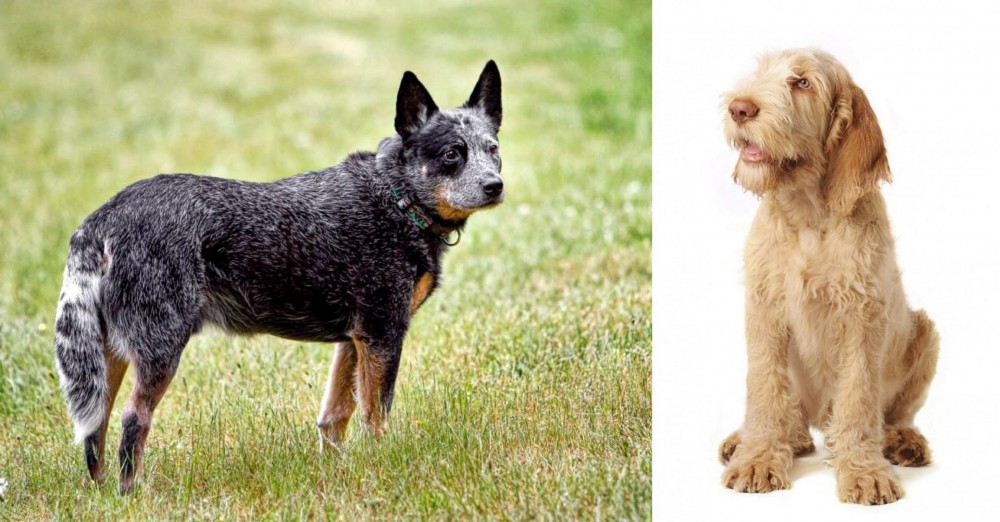 Austrailian Blue Heeler is originated from Australia but Spinone Italiano is originated from Italy. Austrailian Blue Heeler may grow 20 cm / 7 inches shorter than Spinone Italiano. Austrailian Blue Heeler may weigh 23 kg / 50 pounds lesser than Spinone Italiano. Austrailian Blue Heeler may live 7 years more than Spinone Italiano. Austrailian Blue Heeler may have less litter size than Spinone Italiano. Austrailian Blue Heeler requires High Maintenance. But Spinone Italiano requires Moderate Maintenance
Austrailian Blue Heeler is originated from Australia but Spinone Italiano is originated from Italy. Austrailian Blue Heeler may grow 20 cm / 7 inches shorter than Spinone Italiano. Austrailian Blue Heeler may weigh 23 kg / 50 pounds lesser than Spinone Italiano. Austrailian Blue Heeler may live 7 years more than Spinone Italiano. Austrailian Blue Heeler may have less litter size than Spinone Italiano. Austrailian Blue Heeler requires High Maintenance. But Spinone Italiano requires Moderate Maintenance
 In 1840, George Elliott made a match with Australian Dingo and Collie and got a clever and very active dog breed – Australian Blue Heeler. Soon, he showed his good herding instincts and protective nature and got really popular among the cattlemen and ranchers. Soon, as the USA soldiers arrived in Australia, they decided that it will be a great dog to bring home.
In 1840, George Elliott made a match with Australian Dingo and Collie and got a clever and very active dog breed – Australian Blue Heeler. Soon, he showed his good herding instincts and protective nature and got really popular among the cattlemen and ranchers. Soon, as the USA soldiers arrived in Australia, they decided that it will be a great dog to bring home.
Australian Blue Heeler has short, double coat. The coat is water resistant and helps them when the temperature is too high as well. Their coat is rough to the touch, naturally. They can be found in blue or red coat colour mix. The Blue Heeler isn’t actually blue, but their black coat has a bluish tint. Red Heelers have red fur instead of black. They have long tails, strong legs, Dingo-like heads with pointy ears and muscular necks and balanced and athletic bodies.
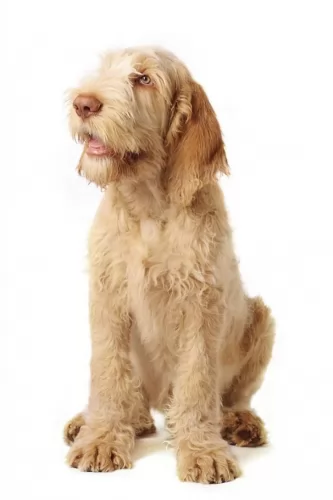 This Italian breed has an ancient blood line tracing all the back to 500 BC. Originally bred to hunt, he is today a friendly, alert and loyal companion. He is intelligent enough to do any job you give him. The Spinone is thought to be one of the oldest gun dogs ever, but it is not entirely clear that he came from Italy. There are some who think he may have come from somewhere in these European countries – Italy, Greece, France, Celtic Ireland, Spain or Russia. However, most believe the breed came from Italy in the Piedmont area.
This Italian breed has an ancient blood line tracing all the back to 500 BC. Originally bred to hunt, he is today a friendly, alert and loyal companion. He is intelligent enough to do any job you give him. The Spinone is thought to be one of the oldest gun dogs ever, but it is not entirely clear that he came from Italy. There are some who think he may have come from somewhere in these European countries – Italy, Greece, France, Celtic Ireland, Spain or Russia. However, most believe the breed came from Italy in the Piedmont area.
The most common thinking is that he is a descendent of the Spanish Pointer and/or the Russian Setter. One other theory is that setters from Greece were brought to the Roman Empire and crossed with a variety of Italian dog to make the coarse haired Spinone we see today. Then the French put in their claim that the breed is a cross of many French pointers.
The theory that counts might just belong to the Italians who believe the ancestor to the Spinone includes the German Wirehaired Pointer, the Pudelpointer and the Wirehaired Pointer. It was not until the 19th century that the name Spinone was officially given to the breed.
Before that it might have been known as a Spinoso and named after a thorn bus in Italy called the Spino. This bush was so thick and sharp that small prey animals learned to hide under it because the predators could not get through it. The Spinone however was able to fight through the briars with its thick, coarse hair and tough skin.
The breed almost became extinct during the second world war as before and after the hunters in Italy had started to use other breeds for hunting. Breeders also began to cross the Spinone with wire hairs like German Wirehaired Pointer, the Wirehaired Pointing Griffon and the Boulet.
The most popular hunting dog in Italy today is the Bracco Italiano while the Spinone is still used for hunting.
 This breed is somehow designed for an outdoor life and outdoor activity. This implies that Blue Heelers have nature made of the high dose of energy. They are always ready to go anywhere you go, and they will be a loyal friend. They are actually very clever, intelligent and ready to help.
This breed is somehow designed for an outdoor life and outdoor activity. This implies that Blue Heelers have nature made of the high dose of energy. They are always ready to go anywhere you go, and they will be a loyal friend. They are actually very clever, intelligent and ready to help.
If you are a type of the person who prefers being indoors and having minimal physical activity, Blue heelers are not the type of a furry companion for you. They have a high daily need for the activity, and they love having lots of space to run and explore. Sometimes, you will realize that having a leash is a must because they will get so playful that they will forget about you!
If you start teaching them to be friendly with other dogs while they are still pups, they will accept that kind of lifestyle. But, if your Blue Heeler is raised as the only dog on the ranch, note that they won’t be very friendly toward other dogs.
Since most of the herd dogs usually respond to only one person, most of the Blue Heelers can follow this old instinct. They can be very independent, as well, and they are usually not the type of the dog that will always be around your leg waiting for a cuddle or ear scratch. But, they build the respect towards humans depending on how they treat him so they can be very lovable and friendly pets.
If you are still confused about their name, you must know that the Blue Heelers can actually lightly nip your heel for attention. They are not aggressive, but they tend to be very protective of the family, humans around them and their property.
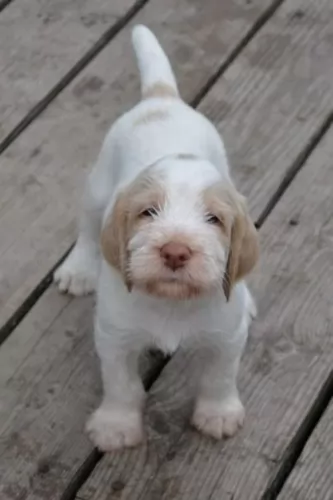 The breed is made up of strong, solid and muscled dogs that have an almost square build. His legs are made to travel any terrain and his head is long with an occipital that is pronounced and unique to the Spinone. They are said to have “human appearing eyes”, with a docked tail in countries allowing it and webbed paws.
The breed is made up of strong, solid and muscled dogs that have an almost square build. His legs are made to travel any terrain and his head is long with an occipital that is pronounced and unique to the Spinone. They are said to have “human appearing eyes”, with a docked tail in countries allowing it and webbed paws.
Shorter hair covers their feet, head, legs, muzzle and ears. They have longer hair on their eyebrows and it is stiff, with soft hair on the muzzle and cheeks with a beard and mustache. It is a single coated dog though the coat is rough. They should have skin, lips, nose, and pads in colors that coordinate with their coats. For white dog it is a red-orange color, brown in dogs that are roan colored and dark red-orange in the orange and white colored dog.
 They are generally good with children, but you must be aware of their inherent desire to herd. Always supervise when your Blue Heeler is around small children.
They are generally good with children, but you must be aware of their inherent desire to herd. Always supervise when your Blue Heeler is around small children.
Ball tricks, frisbee fun, running companion, herding cattle.
It is best to buy a puppy. These dogs get attached to one human and to the territory.
They are generally quick learners. If you teach them to be playful, friendly and loving, they will learn it in no time. So be aware of the decisions that can cost you when the dog grows up.
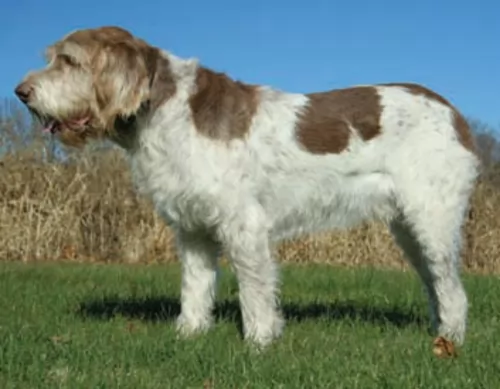 3.Adaptability – Young dogs need a lot of attention but they don’t need a lot of space. The young dogs are energetic while the adult dogs are laid-back. They need exercise every day and at least a small back yard.
3.Adaptability – Young dogs need a lot of attention but they don’t need a lot of space. The young dogs are energetic while the adult dogs are laid-back. They need exercise every day and at least a small back yard.
 Progressive Retinal Atrophy usually causes slow and painless loss of sight. This process takes years, but there are cases where this disease took only months before the dog ended up completely blind.
It is advisable to take your Blue Heeler to the vet for a test that can tell you if your dog is carrying the gene for this disease.
Progressive Retinal Atrophy usually causes slow and painless loss of sight. This process takes years, but there are cases where this disease took only months before the dog ended up completely blind.
It is advisable to take your Blue Heeler to the vet for a test that can tell you if your dog is carrying the gene for this disease.
Lens luxation is a disease where the lens of dog’s eye separates partially or completely. Good news is that this disease can be treated.
Most common is the hip or elbow dysplasia. This is the disease where hip joints do not develop properly and begin to grind. This condition can sometimes be treated with physiotherapy, but there is a chance that your Blue Heeler will need a surgery. If you have a habit of regular vet checks and keeping your dog slim and fed with quality food, you can a make a big difference.
Osteochondritis Dissecans (OCD) causes the dog to have excess cartilage and deficient bone, where cartilage does not get replaced by bone during fetal development. This disease usually requires surgery and prescribed medicines.
Congenital hereditary sensorineural deafness – CHSD is a common form of deafness.
Bilateral deafness can be identified when the dog is still a puppy, more-less at six weeks of age. A puppy with deafness in only one ear is harder to identify, but it can happen.
Portosystemic shunt means that the blood flow is getting back into the bloodstream instead of passing through the liver. That means that liver can’t clear out the toxins, and the organ itself fails to grow properly. This inherited type of shunt can be treated with surgery if the diagnose is set on time.
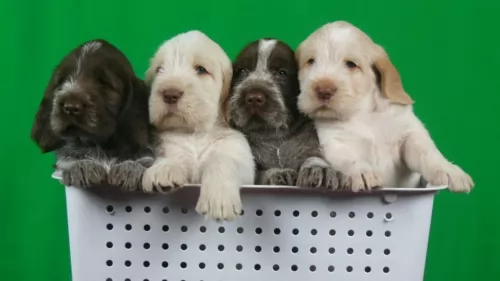 This is an ancient breed with not a lot of documented genetic issues, but it does have one deadly condition.
This is an ancient breed with not a lot of documented genetic issues, but it does have one deadly condition.
• Cerebellar ataxia (CA) is inherited and hits the puppies. Because it is a recessive gene both the mother and father must carry it for the puppy to inherit it. This makes it less likely than it would be otherwise. Puppies with the condition do not live more than a year. Since it is a genetic problem there is now a test for it that identifies carriers at a 95% accuracy rate.
• Like many other large breed dogs, they are susceptible to hip dysplasia. This can cause arthritis and/or lameness. There are now hip replacement surgeries available for this condition.
• Bloat is again common in large dogs and you need to watch for it with the Spinone. It can be deadly if not treated immediately. Let your dog rest quietly after eating. Do not let her exercise or play energetically after eating.
 Choose a dog food that will provide nutrients that will help in the bone developing. Since they are more likely to suffer from joint diseases, you must take this advice seriously. It would be great if you speak about this with your vet before you choose food on your own.
Choose a dog food that will provide nutrients that will help in the bone developing. Since they are more likely to suffer from joint diseases, you must take this advice seriously. It would be great if you speak about this with your vet before you choose food on your own.
The best food for Blue Heeler is a high-quality food which supplies them with premium nutrition to fuel their activity.
They also drink a lot of water, so be sure that they always have a fresh water available.
Lots and lots of the outdoor activity and a quality food. You must be very cautious because this kind of dogs gets overweight easily because they just love the treats and extra food portion.
Any outdoor activity that is mentally challenging and interesting enough to keep them from running in the field trying to catch anything that moves.
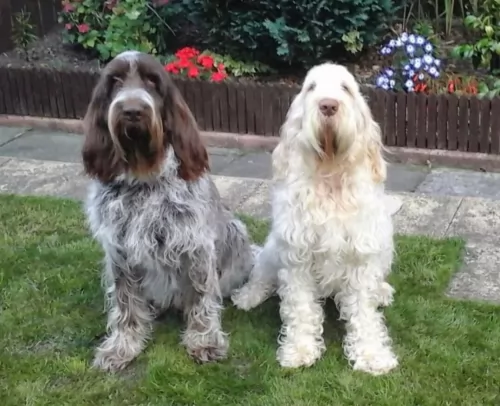 1Feeding the puppy – feed a high quality dog food for puppies of large breeds. Feed 3-4x day but don’t overfeed or let him exercise after eating even as a puppy.
1Feeding the puppy – feed a high quality dog food for puppies of large breeds. Feed 3-4x day but don’t overfeed or let him exercise after eating even as a puppy.
2.Feeding the adult - feed a high quality dog food for large breeds. Feed 1-2X day but don’t overfeed or let him exercise after eating.
4. Games and Exercises – The Spinone is an active breed, but not a fast dog. In fact, they like to travel at a trot so it becomes a great dog for jogging or running with. They love to jump, track, hunt, hike. They do well with agility, retrieving, flyball, carting, being a therapy dog, a rescue dog and a watchdog.